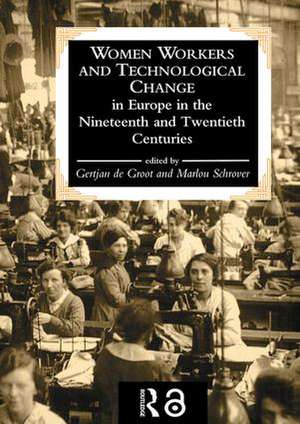Women Workers And Technological Change In Europe In The Nineteenth And twentieth century
Editat de Gertjan De Groot, Marlou Schroveren Limba Engleză Hardback – 22 feb 1995
Preț: 1006.43 lei
Preț vechi: 1227.35 lei
-18% Nou
Puncte Express: 1510
Preț estimativ în valută:
192.60€ • 209.14$ • 161.79£
192.60€ • 209.14$ • 161.79£
Carte tipărită la comandă
Livrare economică 22 aprilie-06 mai
Preluare comenzi: 021 569.72.76
Specificații
ISBN-13: 9780748402601
ISBN-10: 0748402608
Pagini: 214
Dimensiuni: 152 x 229 x 19 mm
Greutate: 0.63 kg
Ediția:1
Editura: Taylor & Francis
Colecția Routledge
Locul publicării:Oxford, United Kingdom
ISBN-10: 0748402608
Pagini: 214
Dimensiuni: 152 x 229 x 19 mm
Greutate: 0.63 kg
Ediția:1
Editura: Taylor & Francis
Colecția Routledge
Locul publicării:Oxford, United Kingdom
Public țintă
UndergraduateCuprins
Chapter 1 General Introduction, Gertjan de Groot, Marlou Schrover; Chapter 2 Frames of Reference: Skill, Gender and New Technology in the Hosiery Industry, Harriet Bradley; Chapter 3 The Creation of a Gendered Division of Labour in the Danish Textile Industry, Marianne Rostgård; Chapter 4 Foreign Technology and the Gender Division of Labour in a Dutch Cotton Spinning Mill, Gertjan de Groot; Chapter 5 ‘The Mysteries of the Typewriter’: Technology and Gender in the British Civil Service, 1870–1914, Meta Zimmeck; Chapter 6 ‘A Revolution in the Workplace’? Women’s Work in Munitions Factories and Technological Change 1914–1918, Deborah Thom; Chapter 7 Gender and Technological Change in the North Staffordshire Pottery Industry, Jacqueline Sarsby; Chapter 8 Periodization and the Engendering of Technology: The Pottery of Gustavsberg, Sweden, 1880–1980, Ulla Wikander; Chapter 9 Creating Gender: Technology and Femininity in the Swedish Dairy Industry, Lena Sommestad; Chapter 10 Cooking up Women’s Work: Women Workers in the Dutch Food Industries 1889–1960, Marlou Schrover;
Notă biografică
Gertjan de Groot, Marlou Schrover
Descriere
Traces the origins of the segregation between women's and men's work in the 19th and 20th century. It rejects the idea that women were mainly employed as unskilled labour, asserting that women's skills were required but that historical records and social definitions of "skill" have denied this.











